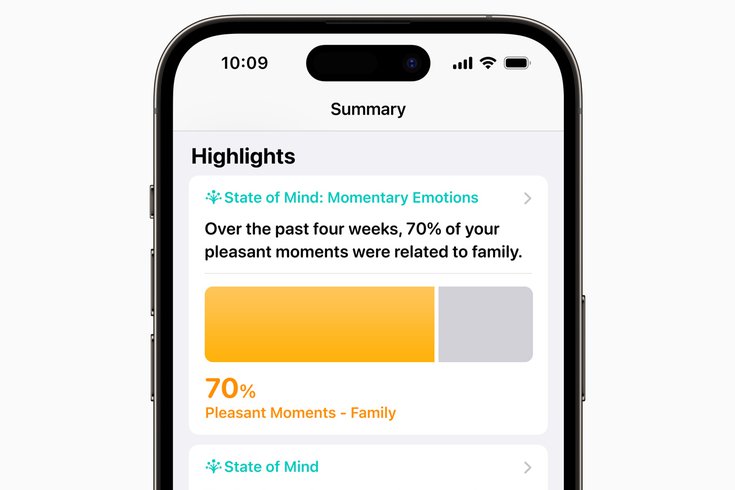
June 06, 2023
 Provided Image/Apple
Provided Image/Apple
Apple's upcoming iOS 17 will feature major updates to its Health app, including a mental health tracker and guides for improving vision and reducing screen time.
Apple soon will add new mental health and vision features to its Health app, the company revealed at its keynote speech during the Worldwide Developers Conference on Monday.
With the iOS 17 software update, expected to be released this September alongside the iPhone 15, Apple users can track momentary emotions and daily moods inside the Health app by choosing three-dimensional shapes to describe their feelings and placing their emotions on a scale from "very pleasant" to "very unpleasant." They also can select what outside stressors are linked to their feelings.
Apple will provide insights into what might be contributing to negative feelings, like lack of sleep, need for exercise or lifestyle factors, and users can find resources for improving their well-being, all in the app. There will also be mental health assessments typically used by health care providers to determine risks of developing more severe mental health issues, with the possibility of sharing results with a doctor.
"Our goal is to empower people to take care of their own health journey," said Dr. Sumbul Desai, Apple's vice president of health. "With these innovative new features, we're expanding the comprehensive range of health and wellness tools that we offer our users across iPhone, iPad and Apple Watch. Mental health and vision health are important, but often overlooked, and we're excited to introduce features that offer valuable new insights to provide users with an even better understanding of their health."
Identifying feelings can help people manage difficult emotions, appreciate positive moments and improve well-being, according to Dr. Michelle Craske, a professor of psychology at UCLA. Acknowledging and accepting difficult feelings can also help with emotional regulation, leading to fewer mood swings and physical reactions to negative emotions.
Apple's new vision features are focused on reducing the risk of myopia, or nearsightedness, in children and young adults. Nearsightedness is the leading cause of vision impairment in the world, impacting nearly 30% of the global population.
Apple Watch wearers will be able to measure the time they spend in daylight and outdoors with iOS 17, and a new feature will encourage iPhone users to move their devices away from their faces after holding them closer than 12 inches for an extended period of time.
Eye care providers believe that spending more time outside and reading further away from books and screens can reduce the risk of developing nearsightedness. The International Myopia Institute recommends children spend 80-120 minutes per day outdoors.
Peter James, an assistant professor at Harvard University's Department of Environmental Health, said that the human instinct to connect with nature may be why spending time outdoors makes people feel better, noting that "the ability to recover from stress is better in natural settings, because that's where we are meant to be. Just the idea of getting out, being in nature, looking at a tree — the theory is that this helps you recover from stress, improves your mental health and improves cognition."
A 2020 study found that spending time in nature can help people feel more relaxed and focused, especially when taking time to acknowledge the surrounding area. It can help with mental stability and balance, particularly in a world filled with stimuli that can leave people feeling overwhelmed.
Apple's iOS 17 will be released after it undergoes testing by developers through most of the summer. For more information about other wellness features being added to iOS 17, check out coverage of Apple's WWDC keynote from Monday afternoon.